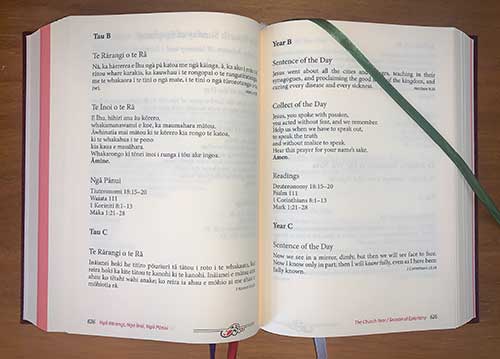
Most astonishingly, the publication of A New Zealand Prayer Book He Karakia Mihinare o Aotearoa 2020 flagrantly defies a decision by General Synod Te Hinota Whanui about the prayer book that should lay out the common prayer of the Anglican Church in Aotearoa, New Zealand and Polynesia.
This is the fourth post in a series on this A New Zealand Prayer Book He Karakia Mihinare o Aotearoa 2020.
The previous posts described:
1) how this book, in many ways, is maybe the book many might have hoped for in 1989,
2) how this book bears the same title as the 1989 book but has quite a different status, and
3) began looking in detail at some of the changes in the book from previous books which bore the same title.
General Synod/te Hīnota Whānui resolved that “in any revision of A New Zealand Prayer Book/He Karakia Mihinare o Aotearoa each Sunday and Holy Day be provided, in the text, with at least one collect which follows the taonga/treasure of Trinitarian collects (that is, addressed to God, the First Person of the Trinity, through Christ, in the Spirit)”.
Clearly, A New Zealand Prayer Book He Karakia Mihinare o Aotearoa 2020 defied this decision.
Look, for example, at the Sunday we have just had (page 625). In Year A, the sole collect presented is
Teach us, Jesus,
NZPB2020 page 625
how to live and worship
without being worldly or greedy…
In Year B, the sole collect presented is
Jesus, you spoke with passion,
NZPB2020 page 625
you acted without fear, and we remember…
Nice prayers, no doubt, but not “addressed to God, the First Person of the Trinity, through Christ, in the Spirit”. Some may respond that there is room for ambiguity in the ruling, that the provision for “a Sunday and Holy Day” extends across three years and that only one of those need be “addressed to God, the First Person of the Trinity, through Christ, in the Spirit”. Well, even with such a misreading of the obvious intention of the General Synod ruling (which is clearly that provisions for any Sunday or Holy Day “be provided, in the text, with at least one collect which follows the taonga/treasure of Trinitarian collects”), The Epiphany, for example is not provided with such a collect:
Jesus, light of the world,
let your bright star stand over the place…
NZPB202 page 565
Or Palm Sunday:
Year A:
NZPB2020 page 579
Jesus, when you rode into Jerusalem…
Year B:
Lord Jesus,
acclaimed as King…
Year C:
Jesus, when you rode into Jerusalem…
And so on.
Here is the motion agreed to by General Synod/te Hīnota Whānui:
THAT this General Synod/te Hīnota Whānui notes plans for a revision to A New Zealand Prayer Book/ He Karakia Mihinare o Aotearoa which would align printed collects with the Revised Common Lectionary, reducing the current provision of three collects per celebration (Sundays, Holy Days) to one collect per celebration (Sundays, Holy Days),1 has been intended to be a helpful revision which brings our prayer book’s printed pages into line with common usage of the Revised Common Lectionary,2 means that not all celebrations would be provided with a collect following the traditional norm of addressing God, the First Person of the Trinity, through Christ, in the Spirit inherited from the early Church via Cranmer and so shared with the rest of the Anglican Communion; and therefore resolves, that in any revision of A New Zealand Prayer Book/He Karakia Mihinare o Aotearoa each Sunday and Holy Day be provided, in the text, with at least one collect which follows the taonga/treasure of Trinitarian collects (that is, addressed to God, the First Person of the Trinity, through Christ, in the Spirit); and that, as far as possible, such a collect be provided in Te Reo Maori as well as English.
General Synod/te Hīnota Whānui 2012 Motion 17
So, we have established that
(1) A New Zealand Prayer Book He Karakia Mihinare o Aotearoa 2020 may have the same title as the book referred to in our Constitution as binding on us and our Church, but it is simply a book with the same name – it is not what is referred to in our Constitution;
(2) A New Zealand Prayer Book He Karakia Mihinare o Aotearoa 2020, unlike the books with the same name from 1989 to 2005, is not binding together the Church’s agreed formularies;
(3) A New Zealand Prayer Book He Karakia Mihinare o Aotearoa 2020 notably defies the General Synod declaration that each Sunday and Holy Day be provided, in the text, with at least one collect which follows the taonga/treasure of Trinitarian collects (that is, addressed to God, the First Person of the Trinity, through Christ, in the Spirit).
Finally, this being the Anglican Church of Or, there is no requirement (or sense of common prayer) to use any particular collect, or even to use a collect at all (I have been present at formal Eucharists with no collect used at all). In our Church’s Lectionary booklet, normally quite a different collect is presented in full for each celebration.
This series continues with how this book has removed collects.
.


